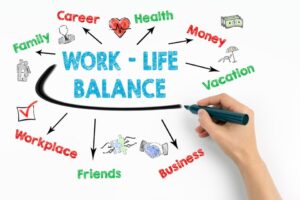A good work-life balance is important for overall health, but many people struggle to maintain it. Drawing a clear line between work and personal life can be challenging in today’s fast-paced world, where we’re all busy and constantly connected to the internet. But finding a work-life balance is essential for your health, happiness, and ability to work productively.
Finding the right balance doesn’t mean splitting your time evenly between work and personal pursuits. It’s more about managing your time and energy so that both can survive without interfering too much with each other. There are simple but effective ways that people can create a schedule that allows them to achieve their goals while still making time for rest, relationships, and self-care.
Why Work-Life Balance Matters
Healthy living reduces stress, prevents burnout, and makes you happier at work and in your personal life. When work takes a toll on your personal life, stress levels rise. This can lead to fatigue, worry, and a decline in overall health. On the other hand, maintaining balance helps you focus, be creative, and get things done, making your life more meaningful and enjoyable.
Research shows that people who prioritize a healthy work-life balance have better physical and mental health, stronger relationships, and are happier. When companies tell their employees to maintain a healthy balance, happiness increases, unemployment decreases, and employee engagement is higher.
How do you know if you’re losing your balance?
Before you make any changes, check to see if you’re in a dangerous state of balance. Frequent fatigue, lack of time for personal activities, feeling stressed or irritated often, having trouble disconnecting from work, strained relationships, and feeling overwhelmed are typical signs. If you recognize any of these signs, it may be time to rethink your goals and make changes to regain control.
By setting clear boundaries
There are no clear boundaries between work and personal life, making it difficult to maintain a balance. Nowadays, many people find it difficult to disconnect from their work responsibilities because they can work from home and access information online. Setting clear boundaries is important to prevent work from invading your personal time.
Establishing clear work hours and sticking to them is a good way to create a habit. By not answering work-related messages and phone calls outside of these times, you can better separate work and play. Having a dedicated workspace can help people who work from home feel less connected to their work life. This makes the transition from work to personal life easier.
Prioritizing and Tracking Time
To stay organized, you need to work smarter, not harder. By focusing on high-impact work, you can accomplish more than if you try to do everything at once. By prioritizing tasks based on how quickly they need to be completed and how important they are, you can avoid unnecessary stress and improve your time management.
The time-blocking method, where you schedule specific times for work, rest, and personal tasks, can help you stay focused. Taking short breaks throughout the day can help you avoid burnout and increase your productivity.
Be Able to Say “No”
Taking on too many personal or work-related commitments at once can quickly tire you out. It’s important to learn to say “no” to simple tasks that don’t help you achieve your personal or professional goals. Knowing your limits and setting realistic goals can help you focus on important tasks instead of unnecessary chores.
Take Care of Yourself
Self-care is important for maintaining balance, but it’s often overlooked. Prioritizing your physical health by eating healthy, exercising regularly, and getting enough sleep can help you improve your overall health. Mindfulness techniques, such as deep breathing or meditation, can help you manage worries and stay clear-headed.
Taking time to exercise, read, or rest can help your brain feel better. Making time for self-care tasks and work meetings can help you prioritize your personal well-being.
Stay away from technology
When you’re constantly connected to work emails, texts, and social media, it can be hard to separate work from home. For a mental break, it’s important to take time away from your computer
Many people don’t want to go on vacation, but regular breaks and vacations are good for your mental and physical health. Taking some time for yourself can clear your head, making you more productive and creative when you return to work. Even a short trip or weekend getaway can be a welcome change.
Seeking Work Flexibility
As the workplace continues to change, many companies now offer open hours. It will be easier to find a better balance if you consider options such as working from home, opening up your hours, or shortening your work week. You will likely be happier at work if you discuss your preferences with your boss and find answers that meet both your professional and personal needs.
Summary
Having a good work-life balance doesn’t mean you have to be perfect; it’s about making choices that put your health first. By setting boundaries, managing your time well, prioritizing yourself, and taking care of your relationships, you can live a fulfilling and healthy life. By taking small, steady steps toward greater balance, you will be happier, less stressed, and healthier in the long run.




